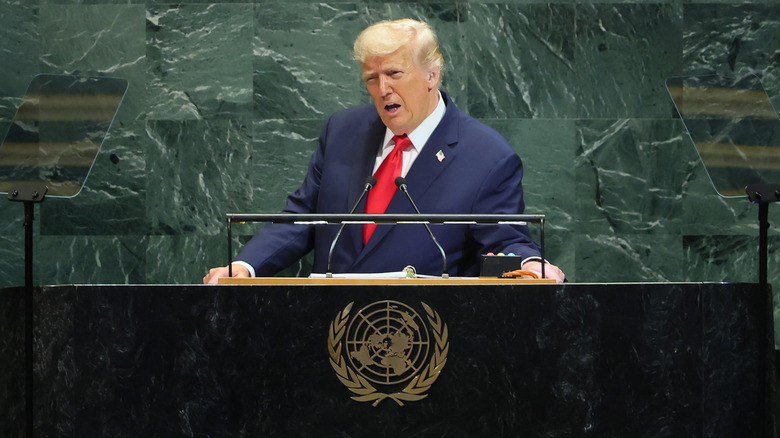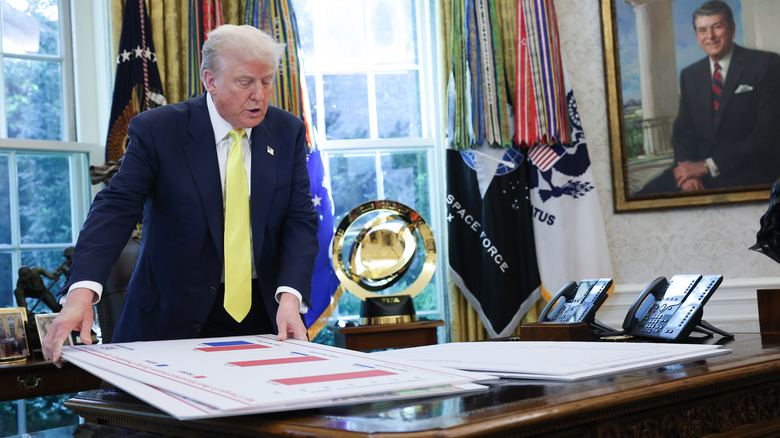Donald Trump Is Placing New Import Taxes On These Items
Trump has regularly asserted that tariffs are paid for by foreign countries wishing to import their goods into the United States that can therefore be used to raise revenues for the government while encouraging domestic production. However, the reality of who actually pays for tariffs is a bit different. Companies importing these products foot the bill, which are then oftentimes passed on to the American consumer. The impact of these tariffs on goods is a big reason why the Federal Reserve has been cautious about lowering interest rates in 2025, since doing so could further bolster inflation.
With that said, on September 25, 2025 President Trump announced a new series of tariffs, via Truth Social, that includes a 50% tariff on kitchen cabinets and bathroom vanities and a 30% tariff on upholstered furniture — an action that will likely further inflate the price of other essential household items not to mention the cost of housing. Those tariffs, as well as foreign duties of 100% on imported pharmaceutical drugs and 25% on heavy and medium trucks, are set to begin on October 1, 2025.
While, on first glance, the pharmaceutical tariff could cause drug prices to rise — which would significantly impact seniors already dealing with Medicare price hikes – it could actually end up being the least detrimental of the lot. While 90% of the ingredients for cheap generic drugs in the U.S. are imported, Trump's order exempts generics and focuses specifically on patented drug companies. That should keep the impact on drug prices moderate.
Why is Trump targeting cabinets and furniture?
Trump wrote that he would be enacting tariffs on kitchen cabinets, bathroom vanities, and upholstered furniture because of the "large scale 'flooding' of these products in the United States by outside countries," adding that "it is a very unfair practice, but we must protect, for National Security and other reasons, our manufacturing process." Under Section 232, the president can enact tariffs on foreign goods on matters related to national security. Towards that end, the Trump Administration launched a Section 232 investigation on imported timber, lumber, and furniture back in March and August of 2025. However, it's worth noting that his 232 order on the issue was issued days after the American Kitchen Cabinet Alliance sent Trump a letter specifically asking him to enact tariffs on foreign cabinets and furniture — stating that the $14 billion domestic cabinet industry was on the verge of being wiped out.
About $25.5 billion worth of furniture, including cabinets, was imported in 2024, per Furniture Today, with much of it coming from China, Vietnam, Mexico, and Canada. Meanwhile, in the U.S., domestic manufacturing companies have cut 42,000 jobs since April 2025, per a Center for American Progress report. In short, Trump's tariffs will make these household items fundamentally more expensive in the U.S., and for much longer, than the administration might want to admit.
Protecting Big Trucks
The final piece of these newest tariffs centers on 25% tariffs on, as Trump described it, "heavy (big!) trucks made in other parts of the world." He went on to say that he aims to protect "large truck manufacturers, such as Peterbilt, Kenworth, Freightliner, Mack Trucks and others" from the "onslaught of outside interruptions." The news caused the stock of Paccar — the owner of Peterbilt and Kenworth trucks — to skyrocket the day after the announcement. Nevertheless, U.S. truck manufacturers might not benefit as much as Trump hopes if the parts needed to make their vehicles are still being hit with the extra tariffs Trump has imposed.
However, this truck tariff is not surprising. In fact, Trump has made his opinion on how tariffs will impact automobile prices clear, telling NBC News that higher costs for foreign cars would encourage American consumers to buy cars made in the U.S. instead. With that said, Trump's order could hit Mexico particular hard, as it is the largest importer of medium and large trucks into the U.S., per the U.S. Department of Commerce's International Trade Administration. Other big truck importers include Canada, Japan, Germany, and Turkey.


